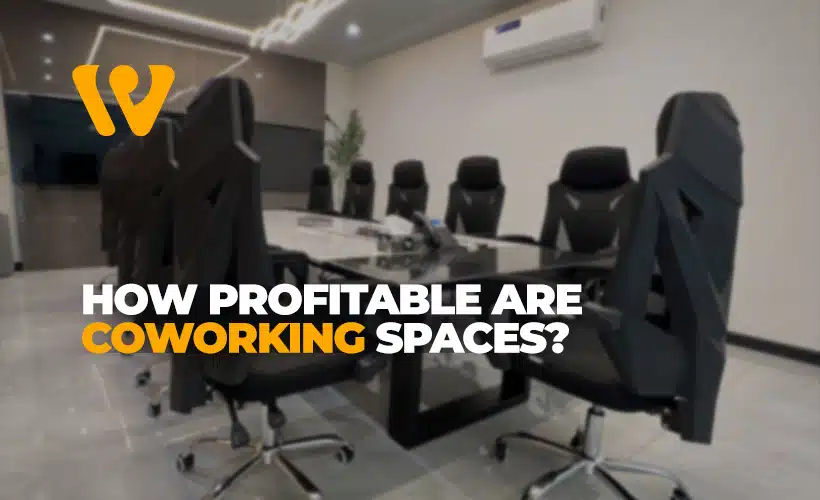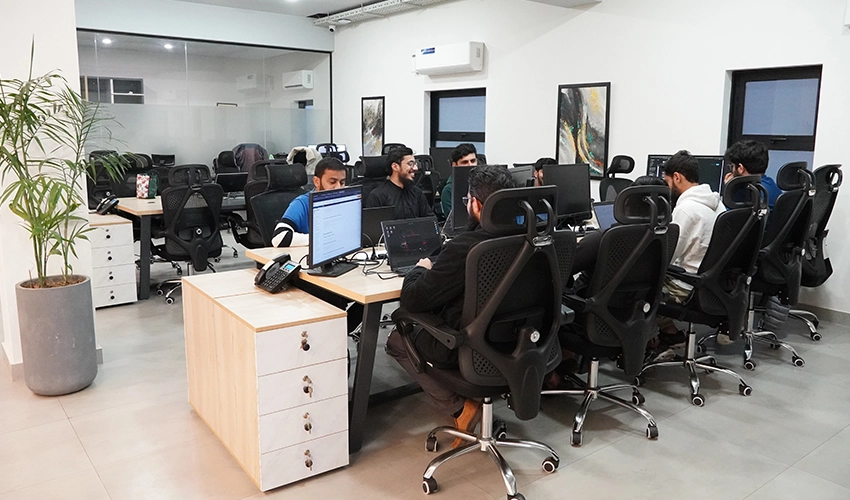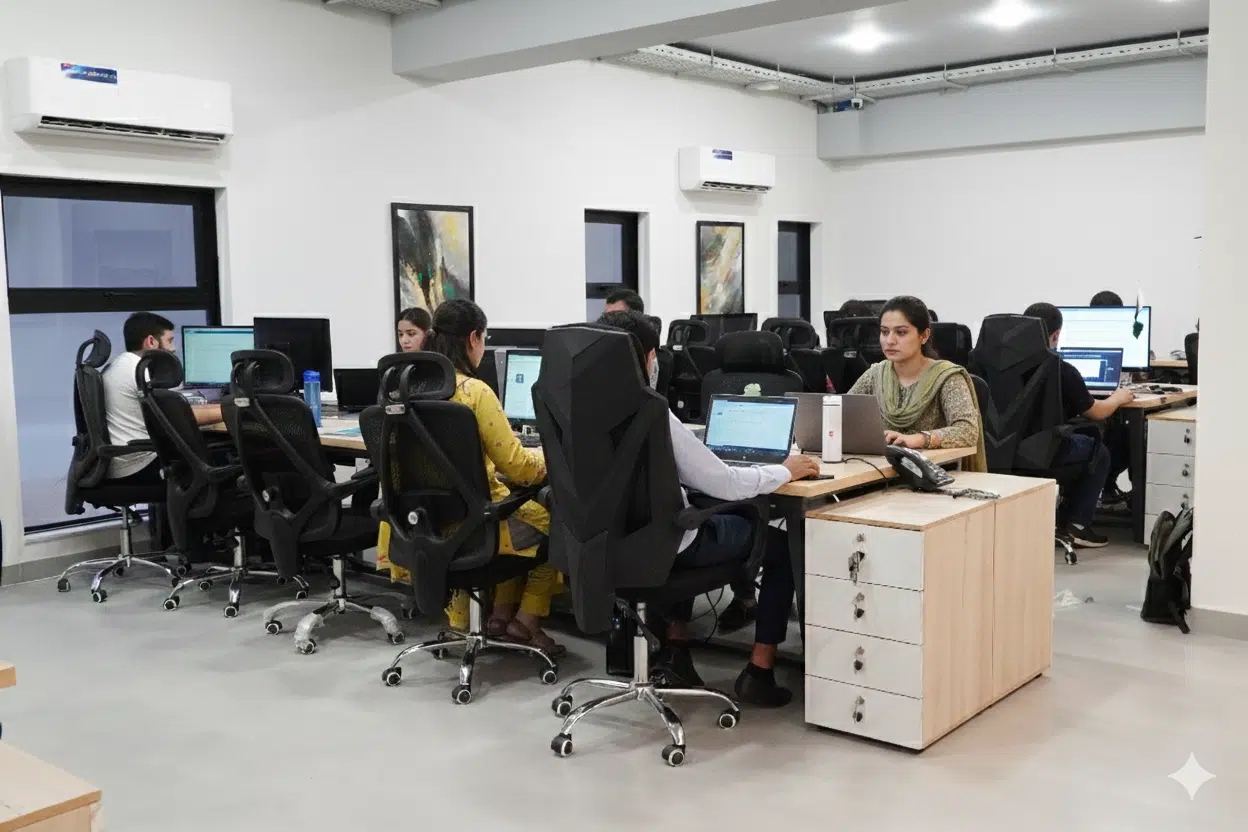Coworking spaces are opening in more and more places. Everyone seems to be working from a shared office, from startups to solo freelancers. But here’s the big question—how profitable are coworking spaces?
Let’s break it down. Whether you’re an entrepreneur planning to open a coworking space or just curious, this guide has all the answers.
How Coworking Culture Is Changing the Way We Work?
Over the past decade, work has undergone significant changes. People no longer want to be stuck in traditional offices. Remote work, freelancing, and entrepreneurship are booming.
Coworking offers something better:
- No long-term lease commitments
- A flexible work environment
- Networking opportunities
That’s why coworking is on the rise. It’s not just about flexibility; it’s a smart, scalable business model that attracts founders, freelancers, and small teams alike.
What Makes Coworking Spaces Profitable?
Coworking operators generate income through multiple channels. They don’t rely on one single revenue stream. Instead, they build layered models that support long-term growth.
According to a study by Statista, the global shared office space market is projected to grow from $41.4 billion in 2024 to $62.75 billion by 2029, highlighting the rising demand and profitability of coworking spaces worldwide.
Coworking spaces make money in several ways. Here are the main revenue streams:
1. Plan options for membership
Monthly fees are paid by members in order to use the space. These plans vary:
- Private offices
- Dedicated desks
- Hot desks
Prices depend on location, amenities, and services. In cities like Lahore, you can earn between PKR 15,000 and PKR 50,000 per member per month.
2. Pay-As-You-Go Access
Not everyone needs a monthly plan. Some professionals prefer flexibility. That’s where day Pay-As-You-Go Access also called Day Passes come in. A day pass gives access to the coworking space for one full day. It’s perfect for travelers, freelancers, remote employees, or even students who just need a change of scene.
These users can come in, grab a desk, use the Wi-Fi, and often enjoy coffee or tea—all without a long-term commitment.
Here’s what a typical day pass may include:
- Access to shared seating or hot desks
- High-speed internet
- Free refreshments (like tea, coffee, or water)
- Use of lounge areas and communal kitchens
- Printing, scanning, or limited meeting room access (in some packages)
Some coworking spaces offer bundle deals, such as 5-day or 10-day passes, to give more value at a slightly lower daily rate.
Day passes help fill empty desks, keep the space lively, and bring in consistent short-term income. They also work as a trial entry point—many first-time visitors turn into long-term members.
Suggested Read: What are the Advantages and Disadvantages of a Private Office?
3. Event Space Rentals
Coworking spaces aren’t just for desks—they’re also great venues. When the workday ends, these spaces can transform into event hubs. Renting out areas for events brings in extra income, especially during evenings or weekends when regular use is low. Here’s what you can host in a coworking space:
- Workshops and Training Sessions
- Business Meetups and Networking Events
- Product Launches and Demos
- Panel Talks and Community Events
- Private Corporate Rentals
It’s a smart way to earn on weekends or evenings.
4. Virtual Office Services
Not every business needs a full-time desk, but many still need a professional presence. That’s where virtual office services come in. Coworking spaces offer business essentials without the need for physical occupancy.
Here’s what’s typically included:
- Business Address: Startups and freelancers can use the coworking space as their official mailing or business registration address.
- Mailing services: Staff receive, sort, and sometimes forward physical mail to the business owner’s chosen location.
- Phone handling: Some spaces provide a dedicated phone line with call answering or forwarding, adding another layer of professionalism.
- Company registration: Coworking spaces help new businesses register legally using the shared address in many regions.
Suggested Read: Who Benefits From Coworking Space?
5. Add-On Services
Coworking spaces do more than provide desks and internet—they create a complete work environment. Many offer optional services that make life easier for members while boosting revenue. Think of it as thoughtful convenience that pays off. Some popular extras include:
- Printing and Scanning
- Storage Lockers
- Meeting rooms access
- Snacks and Beverages
- Tech and Office Supplies
Each add-on improves the user experience and opens new income channels. They’re small, but together, they make a big difference.
Cost to Run a Coworking Space
Profitability isn’t just about what you earn—it’s also about how well you manage what you spend. To run a successful coworking space, you must balance revenue with overhead. Here are the main costs:
- Rent or mortgage
- Utilities such as electricity, water, and HVAC
- Internet and Tech Infrastructure
- Furniture and Interior Setup
- Staff salaries
- Marketing and Outreach
If you’re smart with space planning and energy use, you can reduce overheads.
Suggested Read: What Are the Benefits of Coworking Spaces?
Real Example: How WorkPod Thrives in Lahore’s Growing Market
Lahore is rapidly becoming a tech and startup hub. As the city’s digital economy expands, the demand for cost-effective and flexible workspaces has exploded.
WorkPod, one of Lahore’s top coworking spaces, shows how the right model can balance community value and business profitability. Located in premium zones, WorkPod has built a sustainable, revenue-generating model by diversifying its offerings.
How WorkPod Drives Profitable Growth
At WorkPod, we’re already building that future. Our space isn’t just about productivity—it’s about belonging and balance.
We offer:
- Tiered Memberships (private offices, hot desks)
This meets different budget levels while maximizing space usage.
- Event halls
These are rented out for workshops, networking events, and brand activations, generating extra income during evenings and weekends.
- Ladies-Only Lounges and Childcare Facilities
These niche amenities attract specific user groups (e.g., working mothers), expanding the customer base.
- Recreation & Cafeteria Areas
These improve user satisfaction and boost retention, helping stabilize monthly income.
By layering its revenue streams and optimizing utility and space use, WorkPod creates a healthy balance between operating costs and profits, proving that coworking spaces can thrive both as community hubs and business ventures.
Suggested Read: Why is Coworking So Popular Across the Globe?
Smart Ways to Boost Profit Margins in Your Coworking Space
To make your coworking space more profitable, it’s not just about filling seats. Thoughtful planning, strong community, and multiple revenue channels play a role. Here’s how you can boost profits effectively:
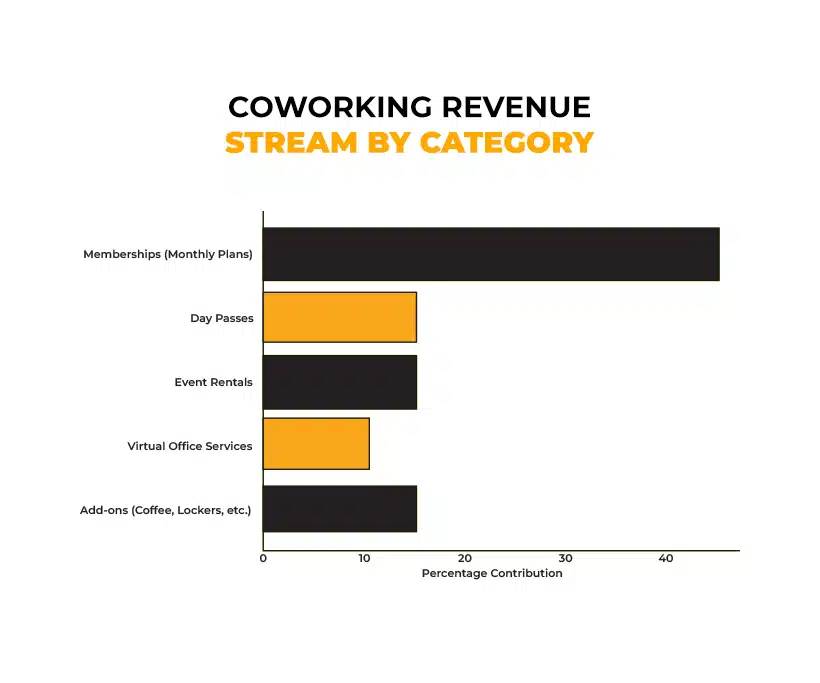
1. Optimize Your Layout for Higher Revenue
Don’t let space go to waste. Convert unused corners into standing desks, phone booths, or quiet zones. Every extra workstation you add increases your capacity—and your earning potential. The more people you can host comfortably, the more monthly income you generate.
2. Build a Strong Community That Retains Members
Happy members don’t just stay; they also bring friends. Hosting networking events, workshops, or social mixers creates a sense of belonging. This reduces churn, extends membership lifecycles, and cuts your acquisition costs, making each customer more profitable.
3. Get the Right People in the Room with Focused Marketing
Focus your marketing efforts where they matter. Run referral programs, collaborate with local businesses, and offer limited-time free trials. Targeted efforts like these don’t just fill seats—they attract the kind of community that sticks around and spreads the word. These tactics attract the right audience and help keep your space consistently booked, improving cash flow.
4. Upsell Premium Services For Value
Locker rentals, priority meeting room access, or a paid coffee station are small add-ons that create ample upsell opportunities. Members often pay more for convenience, which contributes directly to the bottom line.
Suggested Read: How Successful Are Coworking Spaces?
5. Diversify Revenue Streams to Stay Stable
Don’t rely only on desk rentals. Mix it with event space bookings, virtual office services, or creative studio setups. A diverse offering keeps your revenue steady, even when one stream slows down.
Is There Demand for Coworking Spaces in 2025?
Yes! stronger than ever. The way we work has changed for good. Why?
- Remote jobs are growing fast.
- Startups want more freedom.
- Big companies are cutting costs and going flexible.
So, more people need smart spaces to work. But not just any space. They want more than a chair and a charger. That’s where the Coworking space steps in. It solves real problems and gives people what they actually need.
Suggested Read: Why Is Coworking the Future?
What Makes a Coworking Space Stand Out?
With rising demand, not all coworking spots are the same. The best ones offer more than Wi-Fi and walls. They focus on the whole experience. Here’s what helps a coworking space shine:
- Fast internet that never drops
- Comfy chairs and clean desks
- Bright, open design that boosts mood
- Free coffee that’s actually good
- Friendly people all around
And more… Spaces like WorkPod offer even more value: event halls, cafeterias, gyms, and even areas just to relax. That’s why they grow faster and retain members longer.
Common Challenges in Running a Coworking Space
Even though coworking spaces are growing fast, success doesn’t come easy. Like any business, there are bumps along the road.
Here are some key hurdles to expect:
- Low occupancy during slow seasons
- Tough competition from new spaces opening nearby
- Economic slowdowns that reduce people’s spending
- Maintenance costs that grow as your space gets busy
But here’s the good news:
Spaces that plan well offer real value and build strong communities often rise above these hurdles. Intelligent management, steady marketing, and member-focused service can turn these risks into rewards.
Suggested Read: What Problem Do Coworking Spaces Solve?
Who Should Start a Coworking Space?
Coworking spaces aren’t just for big corporations or trendy startups. In reality, they’re one of the most flexible and future-proof business models available today. If you’ve got extra space, an entrepreneurial mindset, or a passion for community, this could be your next big opportunity. Here’s who can thrive in the coworking business:
- Property Owners
Have an unused floor or vacant commercial property? Turn idle real estate into a recurring revenue stream—without dealing with long-term tenants. Coworking spaces are easier to manage, attract a variety of users, and can scale flexibly with demand.
- Entrepreneurs
Looking for a business that supports other businesses? A coworking space lets you build a local brand, nurture a vibrant community, and create multiple income streams, from memberships to events to virtual offices.
- Investors
Searching for a wise investment with steady cash flow? Coworking is a scalable, high-demand sector, especially in tech-forward cities like Lahore. With diversified revenue (desks, events, virtual offices), your risk is spread, and the ROI potential is strong.
- Freelancers or Creatives
Are you tired of working in isolation? Create the community you wish existed. Many successful coworking spaces are founded by creators who design for their own needs and then attract others with the same vibe.
Tip: If you’re serious about starting but unsure how to begin, check out our blog on Cost-Effective Solutions for Private Office Spaces to plan your layout and set up budget-smart. If you have space and a vision, you can make it work.
What’s the Future of Coworking?
Coworking is no longer just about a desk and Wi-Fi. It’s about how people want to live, work, and connect with others. As work becomes more flexible, coworking spaces are evolving to meet deeper human needs.
The future coworking space will offer the following:
- Wellness zones to recharge your mind and body.
- On-site childcare so parents can focus, stress-free
- Podcast and content rooms for creators and marketers
- Advanced tech integrations for seamless hybrid work
- More focus on experience—not just space
People no longer just want to work. They want to enjoy working. They want a space that feels inspiring, safe, and supportive. By the way, if you’re going to have all these excellent facilities, give Workpod a call. (because we got it all)
Recommended Reading: Top Amenities in Coworking Spaces for High Productivity
Creating a Niche-Focused Coworking Space: A Smart Path to Higher Profits
Trying to serve everyone is where many coworking spaces go wrong. The most profitable coworking models often target a specific group of users, also known as a niche.
Why is that more profitable? Because niche communities bring loyal members, faster referrals, and less competition. Plus, when you meet the exact needs of your members, they’re willing to pay more for the right features.
This approach doesn’t just build a strong brand—it drives higher revenue per square foot.
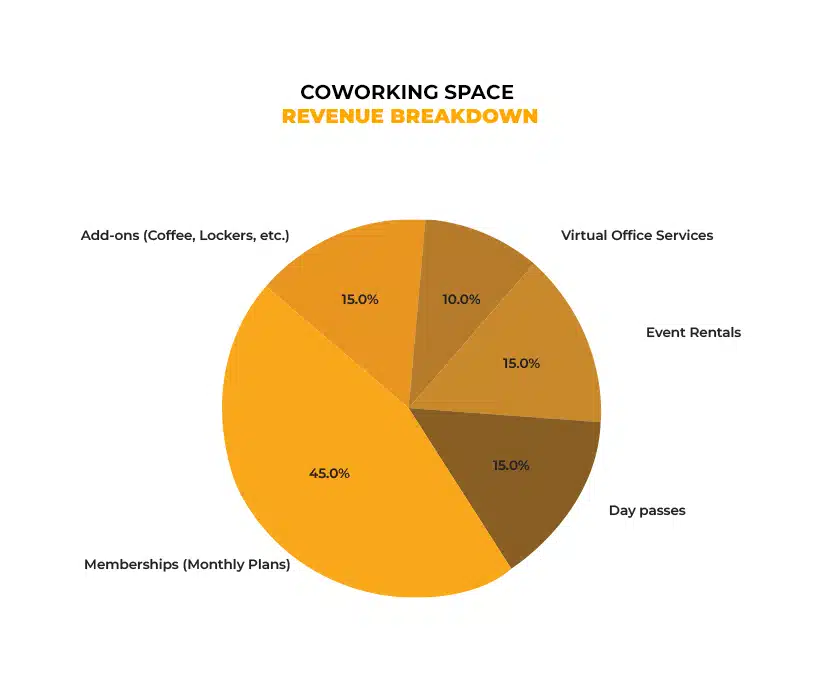
Examples of Niches That Work
- Tech founders & startups – Include pitch rooms, fast internet, and coding sprints.
- Creative professionals – Offer photo studios, podcast booths, and art-friendly interiors.
- Female-led entrepreneurs – Add nursing areas, female-only lounges, and mentoring circles.
- Sustainable brands – Focus on eco-friendly furniture, green certifications, and solar power.
When you design for a group, your space becomes more than a workspace—it becomes a home for ideas.
Final Verdict: Are Coworking Spaces Profitable?
Yes. Coworking spaces are very profitable when done right. The model works well in cities with growing business communities. You don’t need fancy tech or big budgets. What you need is:
- A welcoming space
- Strong community vibes
- Smart pricing
- Consistent service
Start small. Scale steadily.
Ready to Build or Join a Coworking Space?
When built with care, coworking spaces offer more than just rooms and desks—they deliver real, lasting profits. The key is smart planning, community focus, and offering services that people truly need.
The demand for flexible workspaces keeps rising in fast-paced cities like Lahore, where remote work and entrepreneurship are growing fast. That demand opens the door to many revenue streams—hot desks, virtual offices, event rentals, and more.
As we’ve already seen in the case of WorkPod, success comes when a space offers more than just a place to sit. It comes when people feel connected, supported, and inspired every day.
Whether you’re an investor, a property owner, or a passionate entrepreneur, coworking is a future-proof business—one that blends people, purpose, and profit. Start small. Think big. And if you’re looking for inspiration or a partner to guide your journey, we’ve got you.
Ready to join? Contact our team to book your desk or onboard your entire office today.


